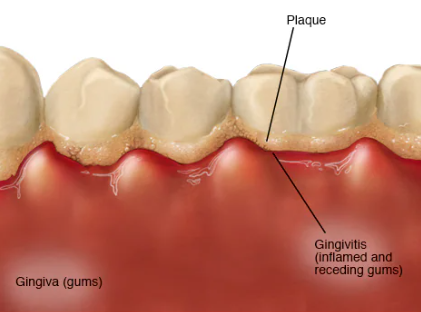When you think about life-threatening conditions, gum disease probably isn’t the first thing that comes to mind. However, what starts as a seemingly harmless case of bleeding gums can potentially escalate into a serious health concern if left unchecked.
This article explores the surprising connection between gingivitis and overall health, answering the alarming question: Can gingivitis actually kill you?
What Is Gingivitis?
Gingivitis is the mildest form of periodontal disease, commonly known as gum disease. It’s an incredibly prevalent dental issue, affecting approximately half of all American adults. Gingivitis occurs when poor oral hygiene leads to an overgrowth of bacteria in the mouth, resulting in inflammation of the gums.
While gingivitis might seem like a minor inconvenience, it’s essential to understand that it’s the first stage of a potentially serious progression of gum disease. If left untreated, gingivitis can advance to more severe forms of periodontal disease, which can have far-reaching consequences for your oral and overall health.
Also Read: Top 10 Bodybuilders in the World: Icons of Strength and Fitness
Symptoms & Stages Of Gum Disease

Recognizing the signs of gingivitis is crucial for early intervention. Common symptoms include:
- Red or purple gums
- Swollen, tender gums that may be painful to touch
- Bleeding gums, especially during brushing or flossing
- Persistent bad breath
- Receding gums
- Soft, spongy gum texture
As gum disease progresses, it advances through several stages:
- Gingivitis: The initial, reversible stage
- Slight Periodontal Disease: Infection spreads to the bone
- Moderate Periodontal Disease: Infection enters the bloodstream
- Advanced Periodontal Disease: Severe infection with potential systemic effects
Also Read: Famous Male Tennis Players: Icons of the Court’s History
The Progression Of Untreated Gingivitis
When gingivitis is left untreated, it can lead to a cascade of increasingly serious dental problems:
- Recurrent gum abscesses (painful pus-filled pockets)
- Damage to the periodontal ligament, which connects teeth to their sockets
- Deterioration of the alveolar bone in the jaw
- Further gum recession
- Loose teeth
- Eventual tooth loss
As the infection deepens, it becomes more challenging to treat and can result in irreversible damage to your oral structures.
Can Gingivitis Be Fatal?
While it’s rare for gingivitis itself to directly cause death, the complications arising from severe, untreated gum disease can potentially be life-threatening in extreme cases. As the infection progresses and enters the bloodstream, it can affect other parts of the body, leading to systemic health issues.
In some instances, gingivitis may develop into a more severe condition called acute necrotizing ulcerative gingivitis (ANUG). This aggressive form of gum disease can cause rapid tissue destruction, leading to permanent damage to gum tissue and, in rare cases, even progressing to gangrene. While uncommon, gangrene is a serious condition that can be life-threatening if left untreated.
Also Read: Top 20 Sexiest Female Athletes Of All Time: Icons of Athletic Beauty
The Link Between Gum Disease & Systemic Health

The potential dangers of gingivitis extend beyond the mouth. Research has shown links between periodontal disease and various systemic health issues, including:
- Cardiovascular disease: The inflammation associated with gum disease may increase the risk of heart disease and stroke.
- Respiratory problems: Bacteria from infected gums can be aspirated into the lungs, potentially causing respiratory infections.
- Diabetes: Gum disease can make it more difficult for people with diabetes to control their blood sugar levels, and conversely, high blood sugar can worsen gum infections.
- Pregnancy complications: Severe gum disease has been associated with an increased risk of premature birth and low birth weight.
While these connections don’t necessarily imply causation, they highlight the importance of maintaining good oral health as part of overall wellness.
Also Read: When Does McDonald’s Start Serving Lunch? Find Out Here!
How To Prevent & Treat Gingivitis
The good news is that gingivitis is largely preventable and, in its early stages, reversible. Here are some key steps to maintain healthy gums:
- Practice proper oral hygiene: Brush your teeth twice daily for two minutes each time, and don’t forget to floss daily.
- Use an antiseptic mouthwash: This can help reduce bacterial growth in your mouth.
- Visit your dentist regularly: Professional cleanings and check-ups twice a year are crucial for early detection and prevention of gum disease.
- Maintain a healthy lifestyle: A balanced diet, avoiding tobacco, and managing stress can all contribute to better gum health.
If you already have gingivitis, your dentist may recommend:
- Professional dental cleaning to remove plaque and tartar
- Improved at-home oral care routine
- Antimicrobial treatments
- In more advanced cases, scaling and root planing or even periodontal surgery may be necessary
For severe cases of periodontal disease, advanced treatments like laser therapy with LANAP (Laser Assisted New Attachment Procedure) can provide effective, less invasive options for restoring gum health.
Also Read: 15 Popular Steaks Types You Must Know [Explore All of Them]
Conclusion
While it’s highly unlikely that gingivitis alone will directly cause death, the potential complications of untreated gum disease should not be taken lightly. From tooth loss to increased risk of systemic health issues, the consequences of neglecting your gum health can be severe and far-reaching.
Remember, healthy gums are typically pink, firm, and don’t bleed easily. If you notice any changes in your gum health, don’t hesitate to consult with a dental professional. Your gums play a crucial role in your oral and overall health – give them the care and attention they deserve.

